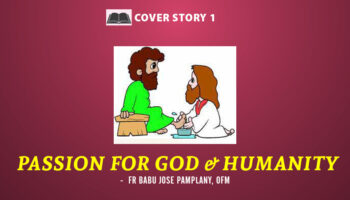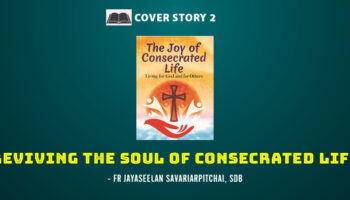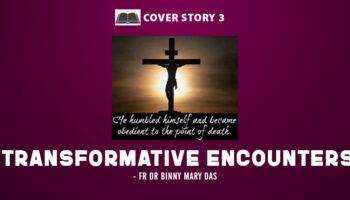Christmas is a time for giving, a time for thinking of others, of finding happiness by reaching out to others. Here are true stories of people who reached out and made a difference—mostly in small, almost unnoticed ways. They show us that, instead of drowning in sweet words and generalities, or spreading bad news (as much of media seems to do), we can spread some love and joy around us, if we choose to.
- Come for My Wedding
Years ago, while discussing with the managers of Pallavan Transport Company in Chennai on ways of helping drivers and conductors, I heard this touching story. Many of the conductors, a manager told me, were educated, but did this job for want of better opportunities. They feel people do not see them as human beings, but simply as someone selling them a ticket. In this connection, he told me that most of the 8000 drivers and conductors had gone to see a Tamil movie called Aval Oru Thodarkathai. Why? The reason was heart-warming. In it, a young woman comes to invite the driver and conductor of a particular bus for her wedding. They ask her why. They do not know her. She tells them, “You may not know me. But I know you. I have been taking this bus every day, and seeing both of you every day. So, I want you to come for my wedding.” The drivers and conductors felt: “Here is someone who thinks of us as human beings, not just as drivers and conductors.”
Whatever a person’s job or status, income or education, all are human beings like ourselves, with the same feelings and the same desire to be recognized and treated as human beings. Is this the way I treat people?
- An Angel for Patients Left Alone
I wrote about him years ago in The New Leader. Mr Devassy, a poor man with a very limited resources, would cycle fifty kilometres every day to go three times a day to the government hospital in Alleppey with food for those who did not have. Seeing what he was doing, others, especially those from his parish, started giving him food for the patients. He would care for patients who had no one with them, especially those from other states. He would take them to the right doctor, dress their wounds, help with their toilet, look for blood, and take them to his small house if they had nowhere to go after they were discharged. Among such patients was Perumal from Tamilnadu, paralyzed after a fall; Ranjit Kumar from Bihar whose wounds he would dress; Latif from Karnataka who had his leg amputated; 69-year-old Narayananan with head injuries and fractured legs whose relatives did not want him back; Navaneen, 68, abandoned by his sons.
Asked how got into this, Devassy replied, “I was once hospitalized. I noticed that an old man next to me had no one to look after him. I started with him. Later, I thought: Why not help more people?” His outlook: “to see others’ bodies as our own body.”
May such GOOD people prod us, lethargic and often self-centred “followers of Christ” to move from a worldly Christmas of cards, cakes, paper stars and special meals to welcoming Jesus. Do we take Him in? How? How often?
- A Top Surgeon’s Humanity
Dr T. J. Cherian MD was certainly a legend in his life time. I heard from other doctors that he was perhaps the most admired medical professional in Chennai—extremely competent, a wizard at diagnosis and very caring towards his patients. He could have minted money if he wanted. But that was not what he was after. One day, a Class IV railway employee from North India was brought for heart surgery to Railway Hospital, Perambur, Chennai. After the surgery, Dr Cherian asked him how he was. The man told him that he was alone and scared. He had no one with him, since he was from North India. Can you guess what this great doctor (who was then director of this famous hospital) did? After supper, he took a mat and slept near the patient!
I have heard many stories about this doctor’s unusual skills and competence. This story and others about his human side are part of what made him a legend.
- “I want to be the first to help!”
A parish priest told me this story. He was working in a poor part of Tamilnadu, where most of the parishioners were landless Dalits. The church was old and small. A decision was made to build a new church. How would they find the funds for it? Most of the people were poor. Struggling for money, the priest had this touching experience. A poor woman selling groundnuts on the roadside came to him. She said, “Father, I heard that we are going to have a new church, and that you are looking for help. I want to be the first to help.” She gave him one hundred Rupees—a huge sum for her.
That brings me to the next story.
- “What struck you most in India?”
I asked a young American called John Stasio who came to India some years ago, travelled around, did some voluntary work and went back, “John, what struck you most in India?” His answer was as unexpected as it was beautiful. He said, “The generosity of the poor. I had never seen such poverty before that. But I also saw how generous the poor are. They have so little in their hut; they are ready to share that with you. I had never seen such generosity before.”
- “They need help. They have no money.”
A Sister Lawyer I know did so much to help a rape victim. The victim was poor, and the rapist was rich and well-connected. There is hardly any chance for a poor woman to win such a case and get justice. So, this Sister used her legal skills to help the woman get justice. (Name withheld for reasons of privacy.) There are a number of Sisters, Priests and other good people who are lawyers, and take up the cases of poor people who cannot afford to pay legal fees. In most countries, jails are crowded with poor people. The rich can use money and influence to stay out of prison, and win cases. The poor cannot.
- A Child’s Savings for Flood Victims
Many of us will have read this story.
Anupriya, an eight-year-old girl from Villupuram in Tamilnadu, saw the plight of flood victims in Kerala. She had collected Rs 9000 over four years to buy a cycle. She donated the whole amount to help those affected by the flood.
As in Jesus’ words about the widow’s mite, a poor girl’s gift of 9000 will mean more to God than 9000 crores from a rich business or government.
- Fasting Instead of Finding Fault
This touching story was told to me last week in Pune. A young Catholic woman told me how good her in-laws are. As an example, she said: On hearing people criticizing priests and religious, her father-in-law decided that it is better to pray for someone than to talk ill of them. So, now, he fasts one day a week, and offers it for priests and religious. Is this out attitude when we hear of someone’s failures? Do we do something about it or simply spread the bad news?
- Their First Christmas as a Couple
Bernard and Angela (names changed) were a newly married couple. This is how they spent their first Christmas as a couple. They decided, instead of going out for a grand meal or buying presents for each other, to spend Christmas helping the Missionaries of Charity to serve meals to the poor. They prayed with them, helped the Sisters to serve the poor, and shared the meal the poor had.
Isn’t this a much more beautiful Christmas meal than an expensive dinner in a swanky place? Or exchanging beautifully wrapped gifts that people really do not need?
- A Christmas Tree with Names of People
A parish priest I know put up a lovely Christmas tree near the Church. On that tree he hung (or stapled) names of poor families in the parish. He then invited the better off people in the parish to pick up a name from the tree, and invite that family to share a Christmas meal. A number of parishioners did.
- “We Feel Honoured to be Here”
Sr Celine Vas, our associate editor, shared with me something beautiful she and her colleagues at St. Aloysius College in Mangalore did once. There were many drivers idling away near the college. Sr Celine suggested to the principal to invite them to the college and conduct a half-day programme for them. This was done—with a talk and items by the students. The principal presided, and gave away prizes to the drivers. As snacks were being served to them, one elderly drive went to the mike and said, “I was outside this college for forty years. I had no chance to get in. Today is a great day in my life. I feel these students and the Sister recognized us as human beings.” Another driver said, “Countless students and parents have travelled in my taxi, but I never felt I was part of this college. Today I feel great to sit here where so many students have sat and made a name. My poverty prevented me from getting an education, but today I feel I am part of this great institute. Thank you for treating us like your family.”
- A Proud Father, a Great Son
A good lay Catholic, whom I have long admired for his integrity and compassion, told me of an experience that thrilled him. While travelling in a crowded train, his teenage son had packed his sleeping bag—a gift from someone overseas—carefully in its case so it would not get dirty. At night, when his father went to the toilet, he noticed that a young couple who had no berth, were lying on the floor on a sleeping bag. He recognized the sleeping bag as his son’s. His son had got up at night, and, without telling anyone, unpacked his brand new sleeping bag and told the couple sleeping on the bare floor, “You can use this.” The man told me, moved: “I feel so happy that my son has a character like this.”
- * * *
There are many, many good people around us. There is much good being done. Unfortunately, evil is more sensational and gets more publicity. We can either simply repeat the scandalous stories we hear, or look around, see the good, learn from it, and tell others about it.
Jesus’ birth was not a huge public event noticed by any media. It was simply the birth of an ordinary woman’s child. But that birth changed history.
We too can do our part to make the world better if we spread a bit of goodness around us when we can. The opportunities are endless, the good examples are many, and our own possibilities are more than we think.
What are you doing with the gifts you have?
Fr Joe Mannath SDB
To subscribe to the magazine, click Subscribe





